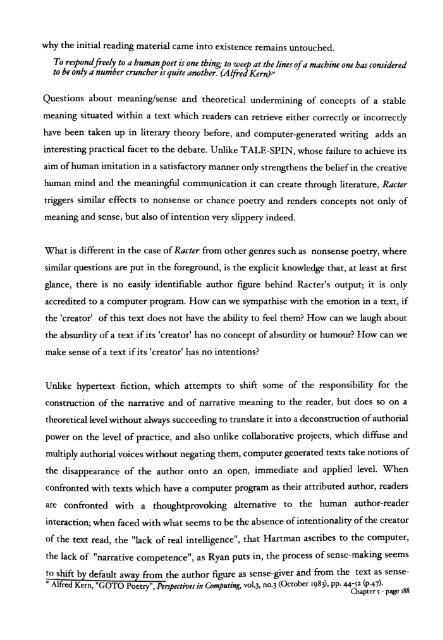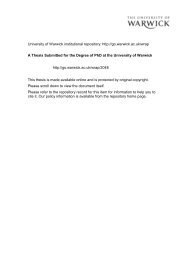From Page to Screen - WRAP: Warwick Research Archive Portal ...
From Page to Screen - WRAP: Warwick Research Archive Portal ...
From Page to Screen - WRAP: Warwick Research Archive Portal ...
You also want an ePaper? Increase the reach of your titles
YUMPU automatically turns print PDFs into web optimized ePapers that Google loves.
why the initial reading material came in<strong>to</strong> existence remains un<strong>to</strong>uched.<br />
To respondfreely <strong>to</strong> a humanpoetis one thing; <strong>to</strong> weep at thelines ofa machine one has considered<br />
<strong>to</strong> beonlya numbercruncber isquiteanother. (AlfredKem)»<br />
Questions about meaning/sense and theoretical undermining of concepts of a stable<br />
meaning situated within a text which readers can retrieve either correctly or incorrectly<br />
have been taken up in literary theory before, and computer-generated writing adds an<br />
interesting practical facet <strong>to</strong> the debate. Unlike TALE-SPIN, whose failure <strong>to</strong> achieve its<br />
aim ofhuman imitation in a satisfac<strong>to</strong>ry manner only strengthens the beliefin the creative<br />
human mind and the meaningful communication it can create through literature, Racter<br />
triggers similar effects <strong>to</strong> nonsense or chance poetry and renders concepts not only of<br />
meaning and sense, but also ofintention very slippery indeed.<br />
What is different in the case ofRacter from other genres such as nonsense poetry, where<br />
similar questions are put in the foreground, is the explicit knowledge that, at least at first<br />
glance, there is no easily identifiable author figure behind Racter's output; it is only<br />
accredited <strong>to</strong> a computer program. How can we sympathise with the emotion in a text, if<br />
the 'crea<strong>to</strong>r' of this text does not have the ability <strong>to</strong> feel them? How can we laugh about<br />
the absurdity ofa text if its 'crea<strong>to</strong>r' has no concept ofabsurdity or humour? How can we<br />
make sense ofa text ifits 'crea<strong>to</strong>r' has no intentions?<br />
Unlike hypertext fiction, which attempts <strong>to</strong> shift some of the responsibility for the<br />
construction of the narrative and of narrative meaning <strong>to</strong> the reader, but does so on a<br />
theoretical level without always succeeding <strong>to</strong> translate it in<strong>to</strong> a deconstruction ofauthorial<br />
power on the level of practice, and also unlike collaborative projects, which diffuse and<br />
multiply authorial voices without negating them, computer generated texts take notions of<br />
the disappearance of the author on<strong>to</strong> an open, immediate and applied level. When<br />
confronted with texts which have a computer program as their attributed author, readers<br />
are confronted with a thoughtprovoking alternative <strong>to</strong> the human author-reader<br />
interaction; when faced withwhat seems <strong>to</strong> be the absence ofintentionality ofthe crea<strong>to</strong>r<br />
of the text read, the "lack of real intelligence", that Hartman ascribes <strong>to</strong> the computer,<br />
the lack of "narrative competence", as Ryan puts in, the process of sense-making seems<br />
<strong>to</strong> shift by default away from the author figure as sense-giver and from the text as sense<br />
.\0 Alfred Kern, "GOTO Poetry" Perspectives in Computing, vol.j, no.j (Oc<strong>to</strong>ber 198j), pp. 44-5 2 (P·47)·<br />
, Chapter s- page 188





